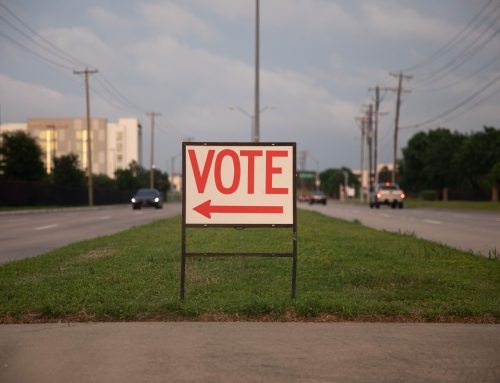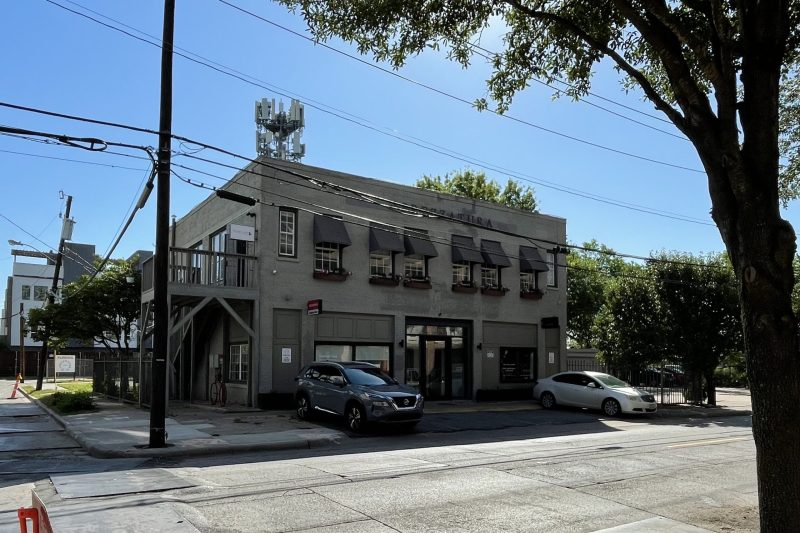
1722 N. Hall St. Photo by Renee Umsted.
Patrick Donlin learned about the reconstruction project that would affect his property and several businesses years ago.
Donlin, who lives in East Dallas, purchased the building at 1722 N. Hall St., at the corner of Hall Street and Roseland Avenue, in 2016. After he bought it, he renovated the property and painted the exterior gray, hiding the orange paint. He also owns the adjacent property at 1716 N. Hall St.
The building has three tenants — Heartland IT Consulting, Andrew Case Insurance Agency and Evolve Real Estate — that rely on 12 parking spaces to comply with their certificates of occupancy.
Years ago, Donlin says he learned that a street and sidewalk reconstruction project would happen on Hall Street between Ross Avenue and Central Expressway, in part to make the area more pedestrian-friendly. He supported the proposal approved by the City Plan Commission to narrow Hall Street between Ross Avenue and Flora to 26 feet and expand the width of the sidewalk by two feet, forming a 7-foot-wide sidewalk on either side of Hall.
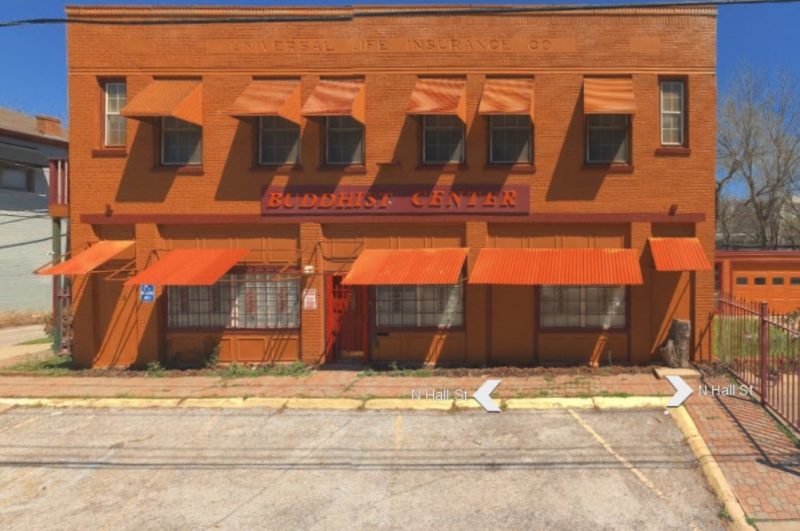
This is what the building at 1722 N. Hall St. looked like before Patrick Donlin renovated it.
But in October 2019, Donlin learned the City would implement a new plan that he says would hurt his business. Four public, parallel parking spots would be added along Hall Street in front of Donlin’s building. Between those parking spots and the building, a 6-foot sidewalk would be poured.
In a 2019 email to then-Council member David Blewett, Ross Williams, who represented Donlin, says the plans that were approved by the City Plan Commission were different from the plans Donlin knew about before the vote and supported. Blewett was asked not to support the plans approved by the CPC. But the plans were adopted by the City Council.
When Paul Ridley was elected to represent District 14, Donlin reached out to him, too. In an email to Donlin, Ridley says, “While I appreciate your support and our dialogue, I will not be changing or halting the Hall St re-pavement project. After speaking to Public Works and visiting the location myself, these improvements are necessary for the benefit of the public.”
Ridley also says the road near Donlin’s business has an “E” pavement grade and needs to be reconstructed.
Since then, Donlin has proposed alternatives that he says would satisfy the City’s goals and help his business continue. But at each suggestion, Donlin has been turned down, with the City moving forward with the publicly approved plans.
There are still options Donlin could pursue to try to mitigate the effects of this project, but he says they won’t address all the issues.
He didn’t choose the location of the fence, and he can’t control the condition of the street and sidewalk. But he’s now dealing with the consequences, which he says will injure his business.
The design for the reconstruction project was finalized last year, and the contract has been awarded, says Hassan Haytham, an engineer with the Department of Public Works. It’s expected to begin this summer and will take around 13 months to complete. Atmos Energy will relocate and upgrade the utilities, and new sidewalks and driveway approaches will be poured. The whole project will meet current standards and be ADA-compliant.
This reconstruction was one of the street improvement projects included in the 2017 bond program, and the plan was approved by the City Council in 2019.
Part of the plan includes removing the perimeter fence around Donlin’s property. Donlin says the fence has been there since the mid-1990s.
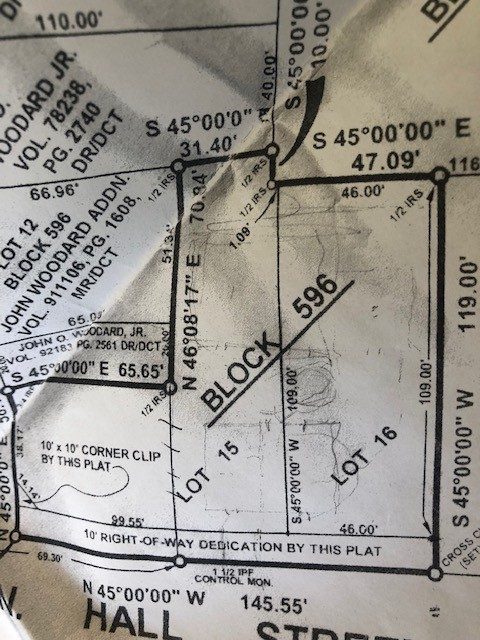
Plat map from 1996. Courtesy of Patrick Donlin.
Four public, parallel parking spots would be added along Hall Street in front of Donlin’s building. Between those parking spots and the building, a 6-foot sidewalk would be poured.
This eliminates the four perpendicular spots currently in front of the building and five additional private parking spaces elsewhere on the property. However, Donlin says the Department of Public Works told him there will be room for two or three spots against the new fence when the project is done, resulting in six or seven spots for the building. Still, that’s not as many as the businesses need to be compliant.
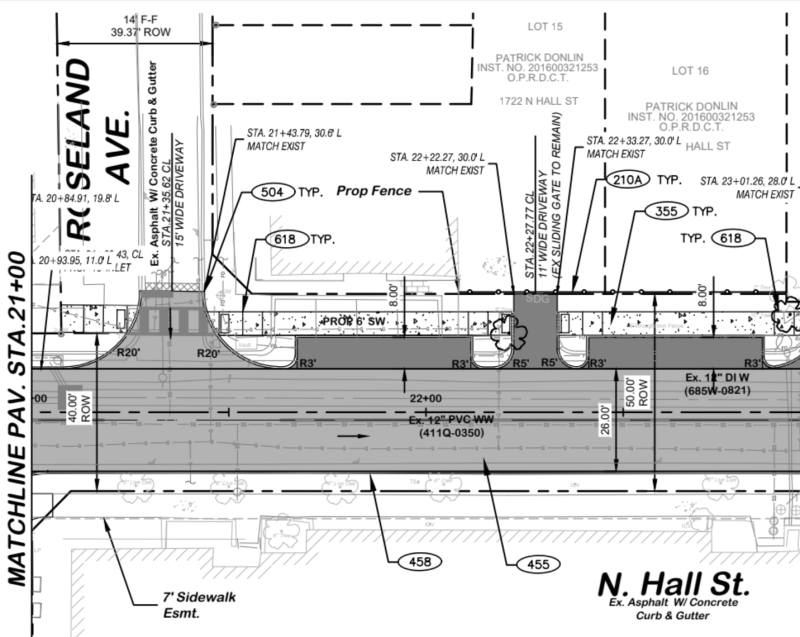
The shaded areas represent proposed concrete pavement and driveways. Plan courtesy of City of Dallas.
A high-res version of the demolition and paving plan is available here.
Haytham says the fence around Donlin’s property is encroaching on the City right-of-way and must be moved to the property line. The Department of Public Works could not find any documents showing that the City allowed the fence to be constructed where it currently is, Haytham says. However, Donlin says the previous owner of the property didn’t think the fence was encroaching the right-of-way and received approval to build the fence, pour concrete and design the property based on where the sidewalk was. (We contacted the previous owner to verify this, but we haven’t received a response.)
“The only reason why this property owner will be impacted is because the place of the fence encroaching City right-of-way,” Haytham says.
Donlin says he has been told by City officials that the city’s Building Inspection officials won’t enforce the new parking requirements for existing building tenants when the project is complete. But when a tenant leaves, a new one won’t be able to move in because of the noncompliant status. That means Donlin will lose leasable space.
Donlin says he suggested a compromise to City officials: If the City would lease him the four parallel parking spots in front of his property, he would pay for them, and the City would consider those private — not public — spots.
“Per the direction received by our City Attorney’s Office and the Real Estate Division, the licensing of public parking as an exclusive ‘private’ parking is not permissible,” Jose Lopez, an engineer at the Department of Public Works, tells Donlin in a May 11 email.
Another option to pursue, Donlin says, is making his case to the Board of Adjustment and asking for a parking variance to reduce his parking requirements. But there would still be another issue: too much demand for parking spaces and not enough supply. In addition, Donlin says he expects the four parallel, public parking spaces will be occupied by shoppers and guests visiting the mixed-use development — including a supermarket and apartments — to be constructed just down the street.
“I would like to come to an agreement so that the City of Dallas can achieve its goals of this project without crippling our small businesses and dramatically reducing the value of our property,” Donlin says.
“It may not sound important to you, but this is a fight I am going to pursue and is very important to our small operation.”
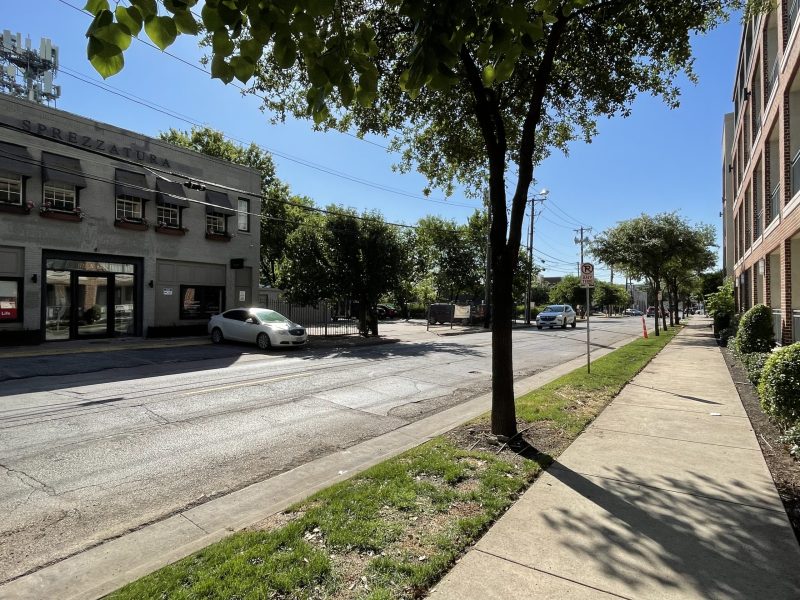
A view of N. Hall Street looking toward Ross Avenue. Photo by Renee Umsted.





